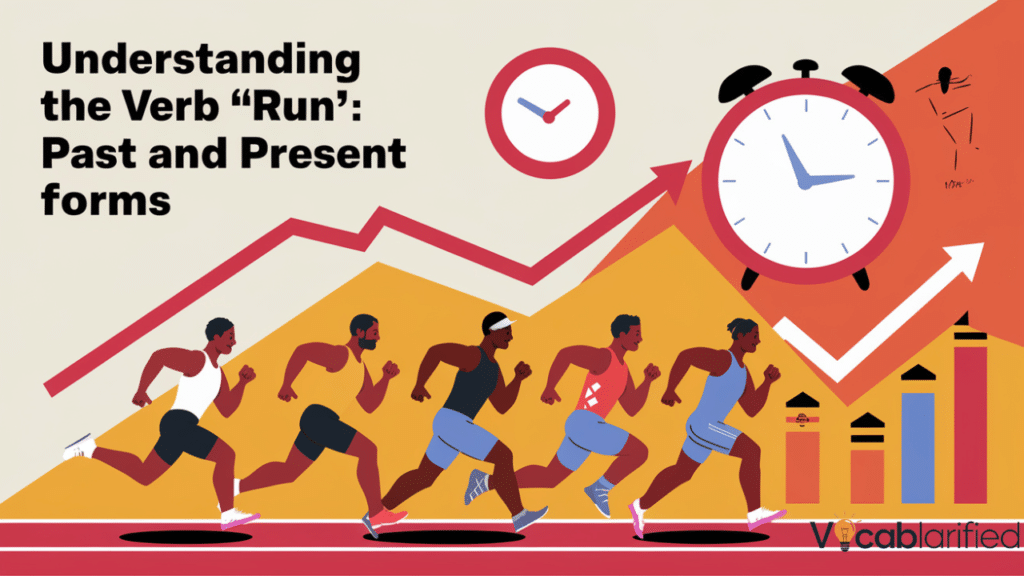English grammar presents numerous challenges for language learners, and verb conjugation stands as one of the most intricate aspects of language learning.
Among the most dynamic verbs in the English language, “run” offers a fascinating study of verb forms and their contextual applications.
The Versatility of Run
The verb “run” exemplifies the complexity of English grammar, demonstrating how a single word can transform across different tenses and contexts. Its flexibility makes it a quintessential example for understanding verb conjugation and improving communication skills.
Fundamental Verb Forms
In its basic form, “run” represents a straightforward action verb. However, its transformation across past tense and past participle forms reveals the nuanced nature of irregular verbs. Unlike regular verbs that simply add “-ed” to create past forms, “run” follows a unique conjugation pattern.
| Verb Form | Example Usage | Context |
|---|---|---|
| Infinitive | To run daily | General intention |
| Present | I run every morning | Current action |
| Past | She ran yesterday | Completed action |
| Past Participle | Have run a marathon | Completed with ongoing relevance |
| Present Participle | Running quickly | Ongoing action |
You Might Like: What is the Plural of ‘Squid’? ‘Squid’ or ‘Squids’?
Understanding Irregular Verb Transformations
Irregular verbs like “run” challenge learners seeking English fluency. While most verbs follow predictable patterns, “run” transforms into “ran” for past tense and “run” for past participle, defying standard conjugation rules.
Pronunciation and Contextual Usage
The pronunciation remains consistent across different forms, which provides a small mercy for those mastering language nuances. When “run” shifts between its forms, the core sound remains unchanged, unlike many other irregular verbs that dramatically alter pronunciation.
Email Scenario Demonstrations
Consider how “run” might appear in professional communication scenarios. An email from project manager Sarah to her team illustrates practical usage:
Subject: Project Status Update
Dear Team,
I have run multiple analyses on our quarterly reports. Yesterday, I ran a comprehensive review of our financial projections. We will have run preliminary assessments by week’s end.
Best regards,
Sarah Thompson
You Might Like: Traveler or Traveller | Which Spelling is Right?
Grammatical Complexity
Writing clarity demands understanding how “run” functions across different grammatical structures. In past perfect tense, the verb requires auxiliary verbs to construct meaningful sentences, demonstrating the intricate grammar rules governing its use.
| Tense | Auxiliary Verb | Example Sentence |
|---|---|---|
| Past Perfect | Had | I had run five miles before breakfast |
| Present Perfect | Have/Has | She has run multiple marathons |
| Future Perfect | Will have | They will have run the entire project by next month |
Common Mistakes in Usage
Learners often struggle with common mistakes when using “run”. Mixing up past tense and past participle forms represents a frequent error that can impede effective communication.
Speaking Practice Insights
Speaking practice reveals how native speakers intuitively navigate the verb’s complex forms. Practicing contextual usage helps learners internalize the nuanced transformations of “run”.

Professional Communication Implications
Mastering verb forms like “run” directly impacts professional communication skills. In business correspondence, precise verb usage signals linguistic competence and attention to detail.
Advanced Verb Transformations
Language nuances become particularly evident when exploring the depth of verb transformations. The verb “run” serves as an excellent case study for understanding the intricate world of English grammar and verb conjugation.
Comprehensive Verb Form Analysis
Professional linguists often examine how verbs like “run” adapt across different grammatical contexts. This exploration reveals the remarkable flexibility of English language structures and their impact on communication skills.
| Verb Context | Formal Usage | Informal Usage | Contextual Difference |
|---|---|---|---|
| Professional Email | I have run the analysis | I ran the numbers | Formality impacts verb selection |
| Academic Writing | The experiment has run its course | The test ran successfully | Precision in language |
| Conversational Speech | I’ve run out of time | I ran late today | Nuanced communication |
You Might Like: Up to Date or Up-to-Date | Which One Should You Use?
Technical Aspects of Verb Conjugation
Verb forms represent more than mere grammatical constructions. They embody the language learning journey, challenging learners to master subtle distinctions in auxiliary verbs and tense applications.
Navigating Complex Communication Scenarios
An illustrative email scenario demonstrates the intricate use of “run” in professional communication:
Subject: Marketing Campaign Update
Dear Michael,
I have run multiple diagnostic tests on our current marketing strategy. We ran preliminary analyses last week, and the team will have run comprehensive evaluations by month’s end.
Regards,
Emily Rodriguez
Grammatical Precision in Different Contexts
Writing clarity demands a nuanced understanding of how “run” operates across various grammatical structures. Each transformation carries subtle implications for effective communication.
| Tense Category | Verb Form | Complexity Level | Communication Impact |
|---|---|---|---|
| Simple Past | Ran | Low | Direct, straightforward |
| Present Perfect | Have run | Medium | Ongoing relevance |
| Past Perfect | Had run | High | Complex temporal relationship |
| Future Perfect | Will have run | Advanced | Anticipatory communication |
Linguistic Challenges and Learning Strategies
Language learning involves navigating the complex terrain of irregular verbs. The verb “run” exemplifies the challenges learners face in achieving English fluency.
Professional and Academic Implications
Mastering verb transformations directly influences communication skills. Professionals across various domains rely on precise language to convey complex ideas effectively.
Practical Application in Different Scenarios
Understanding the verb “run” extends beyond academic exercise. It represents a practical skill in effective communication, bridging theoretical knowledge and real-world language use.
Cultural and Contextual Variations
Language nuances reveal themselves through subtle variations in verb usage. The verb “run” adapts differently across various cultural and professional contexts, highlighting the dynamic nature of English grammar.
| Cultural Context | Verb Usage | Linguistic Variation |
|---|---|---|
| Business | Running a company | Operational leadership |
| Sports | Running a race | Physical performance |
| Technology | Running a program | Technical operation |
| Politics | Running for office | Electoral participation |
Pronunciation and Phonetic Considerations
The phonetic consistency of “run” across its various forms provides a small advantage for language learners. Unlike many irregular verbs, its core pronunciation remains stable.
Email and Professional Communication Strategies
Crafting precise communication requires understanding verb conjugation. An example demonstrates strategic verb usage:
Subject: Project Retrospective
Dear Alexander,
After we ran the initial assessment, I have run multiple scenarios to evaluate our project’s outcomes. The team will have run comprehensive analyses by next week.
Best regards,
Rachel Thompson
Common Mistakes and Learning Opportunities
Common mistakes in verb usage often stem from misunderstanding grammar rules. The verb “run” presents unique challenges that require focused speaking practice.
Holistic Language Learning Approach
Achieving English fluency involves more than memorizing verb forms. It requires understanding contextual usage and the subtle nuances of communication.
Psychological Aspects of Language Mastery
Learning complex verb transformations like “run” involves psychological adaptation. Learners must develop mental flexibility to navigate linguistic challenges.
Final Insights
The journey of mastering the verb “run” represents a microcosm of language learning. Each transformation, each subtle variation, contributes to a deeper understanding of English grammar and communication skills.
Embracing these linguistic complexities transforms language learning from a mechanical process to an art form of effective communication. The verb “run” stands as a testament to the rich, dynamic nature of the English language.

Emma Carter is an experienced blogger at Vocablarified. She enjoys helping people expand their vocabulary and improve their language skills. With a warm and approachable writing style, Emma makes learning new words fun and accessible. When she’s not writing, she loves reading books and discovering new phrases to share with her readers. Emma is passionate about making language learning an enjoyable journey for everyone.







